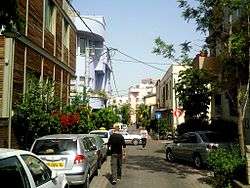Eddy Palacci
Edmond Vita Palacci (1931–2016), generally known as "Eddy Palacci," was a French-Israeli chemical engineer and author, whose memoirs recount his survival in Occupied France during World War II and help for the French Resistance.[1][2][3][4][5]
Eddy Palacci | |
|---|---|
| Born | February 9, 1931 Paris |
| Died | October 29, 2016 (aged 85) Tel Aviv |
| Nationality | French-Israeli |
| Occupation | Chemical engineer, author |
| Spouse(s) | Laora Hurvitz |
| Parent(s) | Isaac Palacci, Marceline Bémant |
| Relatives | Colette Rossant (sister), Juliette Rossant (niece) |
| Family | Pallache family |
Background
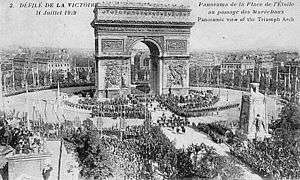
Edmond Vita Palacci was born on February 9, 1931, in Paris. In the mid-1930s, he traveled with his family to Cairo, where they hoped his Egyptian-born father would recover from illness. In the summer of 1939, weeks before Nazi Germany invaded Poland, Palacci's mother sent him home to her parents in Paris.[1][2][3][4][5]
Occupied France
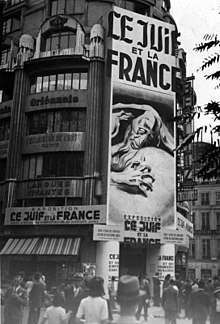
The German invasion of Poland in September 1939 marked the beginning of World War II. In Paris, his maternal grandfather decided the war would not last long and that his grandson should stay in Paris rather than return to Cairo, where his mother, father, and sister remained.[1][2][3][4][5]
When the Nazi attacked France in 1940, his grandparents fled south with him but soon returned to Paris. He experienced anti-semitism in school during the rest of the occupation. By 1942, he had to wear a yellow star in public. Seven members of his family were rounded up and deported to the Vel d'Hiv.[1][2][3][4][5]
French Resistance
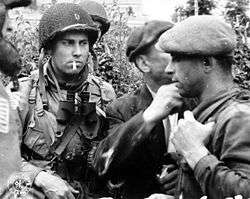
When the Gestapo started a hunt for Jews in Paris, his grandparents decided to hide Palacci on a farm in Les Essarts-le-Roi, near Rambouillet, outside Paris. He spent the rest of the war there (January–September 1944), where he wound up supporting the French Resistance, as detailed in his memoir.[1][2][3][4][5]
Palacci's interaction with the French Resistance began in June 1943 in Paris, when he overheard a secret "Ventriloque" ("Ventriloquist") transmission on a friend's crystal radio set. At Essarts-le-Roi, he discovered three officers–British, Canadian, and American–on the scene to sabotage railway. They give him a nightly assignment: listen to Ventriloque for messages. Ignorant of their meaning, Palacci shared the messages with the officers. Over time, they gave him more specific instructions. Finally, in June 1944, they told him to listen for Paul Verlaine's poem "Chanson d'automne" ("Autumn Song"), whose first verse contained a signal. On June 5, he heard the second line started "Bercent mon cœur d'une langueur monotone" ("Lull my heart with monotonous languor"): the original reads "Blessent mon cœur d'une langueur monotone" ("Wound my heart with monotonous languor"). He noted the change to the officers, who went into action.[6]. The next day, June 6, 1944, was D-Day, the first day of the Normandy landings.
Career
After the war, Palacci learned that during the war his father had died in Egypt and his maternal grandfather in Paris. His mother and then sister returned from Egypt and lived with his grandmother and him in Paris. He finished his schooling and university with a degree in chemical engineering (rubber and polymers).[1][2][3]
He started military service in 1954 and served in Algeria (1955-1956) as an officer.[1][2][3][5]
In 1957, he returned to Paris and worked as an engineer chemist in several plants.[1][2][3][4][5]
In 1960, he left with his wife to live in Israel.[1][2][3][4]
In Israel, he worked in chemical industries that included: tires, detergents, insecticides, industrial chemicals, buildings, and ecology. He also translated between Hebrew, French, and English and served as an ISO-9000 quality control consultant. His wife also worked in translation.[2][3][5]
In 1992, he published his memoir in Hebrew.[3][4][5]
From 1993 onwards, Palacci and wife were very active in "Aloumim" (children hidden in France). For some time, he served as the organization's vice-president. He strove for restitution to those French Jews interned in Nazi concentration camps during World War II.[2][3][5][7]
In 2013, he translated his memoir into French. He also wrote poems and articles for newspapers.[2][3][4]
Personal and death
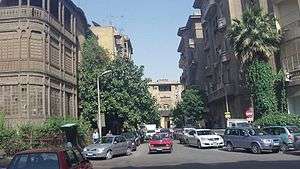
Palacci's parents met in Paris at a wedding. His father, who was ill for much of his life, returned with his family to Garden City, Cairo, Egypt for warmer weather.[1]
He came from both Sephardic and Ashkenazi families:
- Sephardic line: The Sephardic Palacci side of his family left Spain after the Alhambra Decree, wound up in Izmir and eventually Cairo. His grandfather Vita Palacci was a well-known department store owner. His father Isaac ("Izka" in his memoir) worked in exports and imports in support of his father's department store.[1]
- Ashkenazi line: The Ashkenazi Rossant branch came from Eastern Europe. His maternal grandfather, "James Bémant," was born "Shlomo Beiman" in what is now Belarus. His maternal grandmother, "Rose Bémant," was born "Esther Rosenberg" in what is now Poland. James' father was a part-time colporteur and pêcheur with nine children. Rose's father was an épicier who became "rich" and had seven children. James and Rose Bémant had two children, Marceline and Charles. Marceline studied at finishing school in Brighton, UK.[1]
In 1957 in Paris, he married Laora Hurwitz, whom he described as a " jeune fille egyptienne née de parents israéliens, familles Biluim (Gedera) et issus de famille fondatrice de Rishon Le Zion et de la Bank Leumi, elle-meme traductrice diplomée de la Sorbonne (français, anglais, hébreu, italien)" (a girl born in Egypt to Israeli parents... and herself a translator of English, French, Hebrew, and Italian, who graduated from the Sorbonne). They moved to Tel Aviv in 1960.[1][2]
On October 29, 2016, he died in Tel Aviv. He was survived by his wife, sister, nieces, and nephew.
Works
Palacci published a memoir in Hebrew in 1992 that features his experiences in France during World War II and translated and published it into French in 2013:
- Palacci, Eddy (1992). Zeakah Ilemet. Tel Aviv: Mirad Ha-Bitahon. Retrieved 29 October 2016.
- Palacci, Eddy (2013). Des étoiles par cœur. Paris: Elzevir. Archived from the original on 10 May 2017. Retrieved 29 October 2016.
See also
References
- Palacci, Eddy (2013). Des étoiles par cœur. Paris: Elzevir. p. 165. Archived from the original on 10 May 2017. Retrieved 29 October 2016.
- "Eddy Palacci". Francophone. Retrieved 29 October 2016.
- "Eddy Palacci". Aloumim. Retrieved 29 October 2016.
- "Eddy Palacci". Babelio. Retrieved 29 October 2016.
- "Edmond Palacci". AJPN. Retrieved 29 October 2016.
- "L'Ecole Centrale de T.S.F. et ses soldats de l'armée des ombres". Paris Ecole d'ingénieurs. Archived from the original on 30 October 2016. Retrieved 29 October 2016.
- "Biens Juifs". Modia. Archived from the original on 27 January 1999. Retrieved 29 October 2016.
External sources
- RFI: audio of Eddy Palacci on the Holocaust
- "Eddy Palacci". Aloumim. Retrieved 29 October 2016.
- "Eddy Palacci". Francophone. Retrieved 29 October 2016.
- "Eddy Palacci". Babel. Retrieved 29 October 2016.
- "Edmond Palacci". AJPN. Retrieved 29 October 2016.

